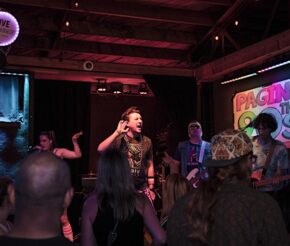- Advertise
-
Subscribe
Sampling for Dummies

Production expertise (or lack thereof) aside, you’ve probably picked a side in the Drake vs Kanye ‘Sampling King’ debate, haven’t you?
We don’t blame you. Sampling is a hot topic in the Hip Hop community – from OG fans to newbies, everyone seems to have an opinion on how it should or shouldn’t be done.
Everyone also seems to not really know what they’re talking about (sorry).
We’re all music experts until it comes to defining what a ‘cut’ or a ‘break beat’ actually is. But don’t sweat it. After reading our guide to ‘Sampling for Dummies’, you’ll be able to prove you know your stuff the next time someone asks you what you thought of Drake’s Right Said Fred sample (spoiler, it’s pretty weird).
Typically, samples take the form of small musical snippets
In essence, a ‘sample’ in musical terms is a piece of audio that has been lifted from a different source and incorporated into a new track.
Typically, they take the form of small sections of music – be that a hook or bass line – from a previously recorded piece.
Sometimes, they’re lifted from further afield. Samples of glass breaking, sirens, and gun shots are commonplace in Gangsta Rap, while snippets from conversations and private voicemails tend to make their way into the music of contemporary rappers like Lauryn Hill, Bryson Tiller, and of course, Ye himself.
A revolutionary practice for American music, pioneered exclusively by Hip Hop DJs in the Bronx
The first digital sampling machine emerged in 1976, though it took a few years for the practice to make its way into the American music scene, rising to prominence throughout the 80’s.
Borrowing snippets of other musicians’ songs as a way of paying homage to them was a common practice among Jazz instrumentalists throughout the early twentieth century. But structuring a new song around a section borrowed from an old one? That was a pretty revolutionary practice for American music, pioneered exclusively by Hip Hop DJs in the Bronx.
Before electronic sampling equipment became widely available, using turntables to loop breaks from funk and soul records was the most common sampling method among artists in the Hip Hop community.
The break – usually a short instrumental or percussive section – was repeated over and over again to form the basis of a new track which an MC would then rap over, using toasts and boasts to diss their competition.

According to WhoSampled.com, James Brown is the most sampled artist of all time, appearing in more than 14,000 tracks.
It’s of no surprise then that Brown has been dubbed the ‘godfather of Hip Hop’, lending his vocals and instrumental lines to a whole host of tracks spanning the earliest samplers right up to the modern titans of the rap game.
Often, samples are used to shout out sources of inspiration and create a black American musical family tree spanning generations of artists.
Sought-after samples are only accessible to artists with big wallets
Nowadays, sampling has exploded outside of the Hip Hop community, having a huge impact on other musical genres like EDM and techno.
In spite of its huge popularity, the practice isn’t as accessible for all artists. Although small sections of songs may be recycled under the ‘fair use’ policy in US trademark law, copyright restrictions prohibit well-known tracks from being used without paying huge royalty fees.
The Hip Hop artists of today are constantly going bigger and bolder with their sampling choices
As the foundation of modern-day Hip Hop, sampling culture is here to stay.
Just take a scroll through some of your favourite rappers’ songs on websites like WhoSampled or Genius and you’ll see just how prevalent the technique really is.
And the Hip Hop artists of today are constantly going bigger and bolder with their sampling choices, pushing the limits of what a sample is thought to be.






